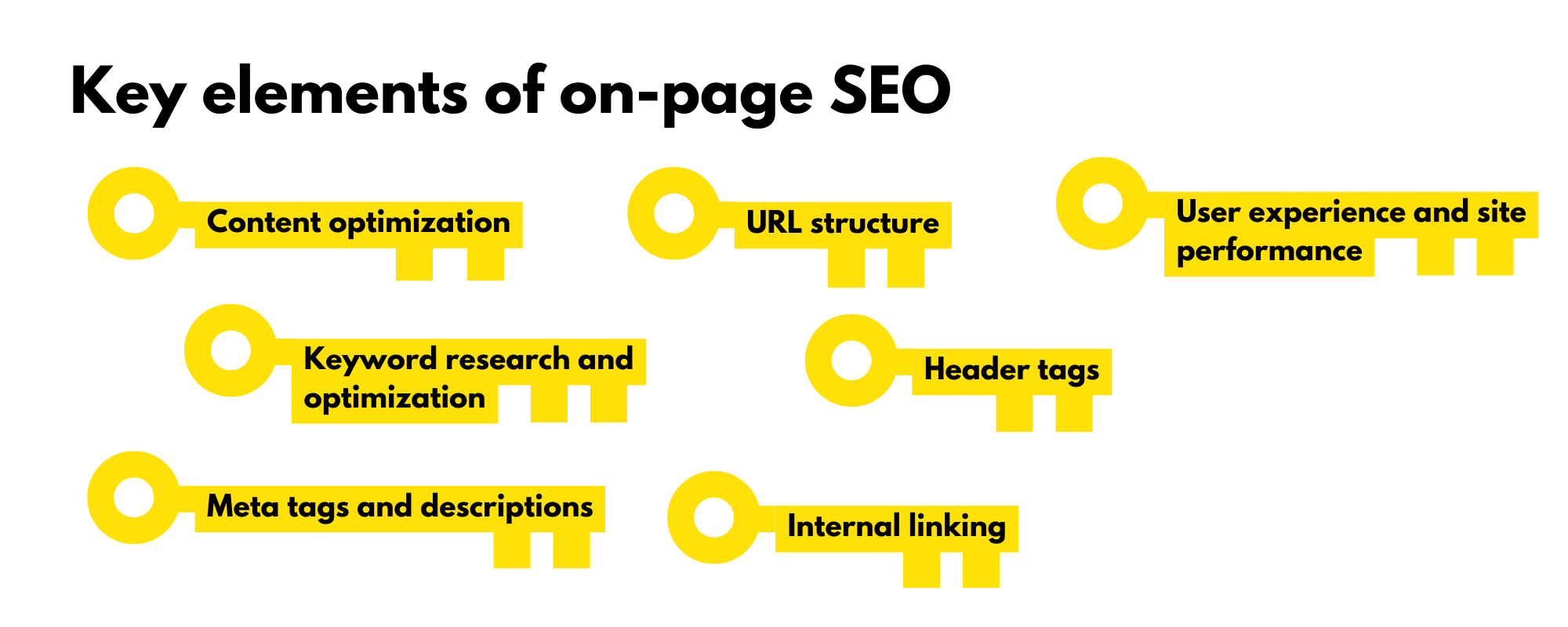
Keyword Optimization For Your On-Page SEO
CATEGORIES
Tags
24/7 analytics australia automation Business Process Outsourcing company Copywriting CRM customer support data data and analytics Delegate digital digital advertising digital marketing Digital Support Staff ecommerce Email Management Email Marketing Entrepreneur Freelance Writers google ads graphic design Hiring Freelancers Marketing offshore offshoring ominchannel support organizer outsource Outsourcing Philippines Project management reporting seo seo audit Shopify Small Business social media Social media experts social media management United States video Virtual Assistant Virtual Team
The moment you build a website for your business, you hear one big thing: keywords. It’s the lifeblood of being online.
When you strategically incorporate relevant keywords into your website content, search engines can better understand the context and relevance of your pages.
When search engines understand what you offer to audiences, they deliver your website to people who search for your content. And if those people do find your content relevant and stay in your site, search engines rank your pages higher and increase your visibility to more visitors.
It’s a cycle of showing search engines you have valuable content and getting increased organic traffic that also tell search engines you do have valuable content.
This cycle starts with keyword optimization.
What is On-Page SEO?
In essence, on-page SEO is keyword optimization of your website. SEO stands for search engine optimization. You simply streamline your website content so that search engines can understand your content.
On-page SEO is also called “saying something to a search engine” and being “search engine- friendly.” Communicating and being friendly to search engines mean using the right keywords on the front end, in your content, and in the back end, in the HTML elements of your website.
It’s also called on-page because it’s on your own website. By contrast, there’s also off-page SEO, which is optimization outside your website, like backlinks from other sites, engagement from social media, and so on.
Here we focus on on-page SEO.
Key elements of on-page SEO
1. Content optimization
When it comes to on-page SEO, content is king. You want to create high-quality, relevant, and engaging content that appeals to both your audience and search engines.
It’s important to naturally incorporate your target keywords throughout the content, ensuring it flows smoothly and provides value to your readers.
2. Keyword research and optimization
Keyword research is like digging for treasure. You need to identify the keywords and phrases that your target audience is using to search for information.
Optimizing your website with these keywords strategically, such as in your content, meta tags, headings, and URLs, helps you increase your chances of showing up in relevant search results.
3. Meta tags and descriptions
Meta tags are like tiny snippets that provide information about your web page to search engines. The title tag and meta description are essential for on-page SEO.
Certain meta tags are accessed by search engines so they can show the page title and description in the search results.
Crafting a captivating and keyword-rich title tag grabs attention, while the meta description provides a concise summary that entices users to click through to your website.
4. URL structure
URLs might not seem like a big deal, but they matter. A URL is an acronym for “Uniform Resource Locator”, and is also known as the address of a specific unique resource on the Internet.
Optimized URLs are short, descriptive, and include keywords when possible.
Clean and user-friendly URL structures help search engines understand your page’s content and make it easier for users to navigate your site.
5. Header tags
Headers are like signposts that guide both readers and search engines through your content. Properly using header tags (H1, H2, H3, and so on) organizes your content hierarchy and helps search engines understand the context.
Don’t forget to include relevant keywords in your headers to give search engines a better idea of what your content is about.
6. Internal linking
Internal linking is like creating a web within your website. Linking relevant pages and content together, you improve navigation, distribute link equity, and make it easier for search engines to discover and index your pages.
Be smart about it and use optimized anchor text to provide context and relevance to the linked pages.
7. User experience and site performance
Search engines want to ensure users have a great experience on your site. Factors like fast page load times, mobile-friendliness, easy navigation, and attractive design all contribute to a positive user experience.
Prioritizing these aspects not only pleases your visitors but also improves your chances of ranking higher in search results.
How to Do Keyword Optimization
Keyword optimization is a big factor in helping your pages rank better and receive more traffic from search engines.
From research to implementation, these practical tips will help you maximize the impact of your keyword optimization efforts.
1. Conduct keyword research.
Conducting keyword research is like peering into the minds of your target audience to discover the exact words they use when searching for information.
Understanding who you’re trying to reach and what you want to achieve is key. Are you targeting young professionals interested in fitness? Or maybe you’re aiming to attract DIY enthusiasts looking for home improvement tips.
Clearly defining your target audience and goals helps you narrow down your keyword research and find those golden keywords that will resonate with your audience.
Start by brainstorming a list of keywords related to your niche or industry. Put yourself in your audience’s shoes and think about the words and phrases they would use when searching for what you offer.
Think both broad terms and more specific, long-tail keywords. Long-tail keywords are often more targeted and can be less competitive.
Tools like Google Keyword Planner, SEMrush, Ahrefs, and Moz Keyword Explorer provide you with a wealth of data and insights.
They can give you search volume estimates, competition analysis, and even suggest related keywords you might not have considered.
2. Create good keyword placements and density.
The key is to make it feel natural and seamless within your content.
Sprinkle keywords strategically throughout the text, ensuring they fit organically within the context. This approach maintains a conversational flow that resonates with your audience.
Title tags and meta descriptions play a significant role in attracting users from search engine results. Optimizing these elements involves including relevant keywords that accurately represent the content of your web pages.
Crafting compelling meta descriptions that incorporate keywords entices users to click through to your website, increasing the likelihood of engagement.
Heading tags (H1, H2, etc.) serve as signposts that guide readers and search engines through your content. Incorporating target keywords naturally into headings aids users and search engines in understanding the main topics and structure of your content.
URLs act as concise roadmaps to your web pages. Incorporating keywords into your URL structure, especially for important pages, provides additional context to search engines and users.
3. Craft high-quality content.
Offer something fresh and different that grabs the attention of your audience. Think about what makes your content special. Share personal experiences, provide unique perspectives, or offer in-depth analysis.
Using keywords effectively is important, but don’t overdo it. Instead of stuffing your content with keywords, focus on using variations of your target keywords naturally within your writing.
This not only makes your content more readable and enjoyable, but it also helps search engines understand the broader context and relevance of your message. Incorporate synonyms, related terms, and long-tail keywords to diversify your keyword usage and expand your reach.
Put yourself in the shoes of your readers and think about what they’re looking for. What questions do they have? What problems are they trying to solve? Tailor your content to address their needs and provide the answers they’re seeking.
Delivering valuable information and meeting user intent, you establish yourself as a trusted resource, encouraging engagement, sharing, and building valuable backlinks.
4. Monitor and adjust your keyword ranking and performance.
Keep an eye on your keyword rankings and performance. Tools like Google Search Console help you see how well your keywords are doing in search results. This lets you know where improvements are needed and where you’re excelling.
Next, analyze user engagement and behavior on your site. Look at metrics like bounce rate and time on page to see how visitors are interacting with your content. This helps you identify areas for improvement and optimize your user experience.
Lastly, continuously refine and update your keyword strategy. SEO is always evolving, so it’s important to stay up to date. Regularly conduct keyword research to discover new opportunities and adapt to changing search trends.
Tools for Keyword Optimization
There are literally hundreds of tools available for keyword research, and they range from being geared toward beginners to being extremely sophisticated. They also range from being quite simplistic and useless to being extremely beneficial.
The best keyword research tools may streamline and simplify your workflow by helping you uncover the best keywords to target and providing you with the information you need to rank for them.
Suggested tools for keyword optimization
1. Google Keyword Planner
This tool is a great starting point for keyword research. It provides insights into keyword search volumes, competition levels, and even suggested bid prices.
You can discover new keyword ideas and assess their potential value in driving organic traffic to your website.
2. SEMrush
If you’re looking for a comprehensive SEO toolkit, SEMrush is a popular choice. Along with many other SEO features, SEMrush offers powerful keyword research capabilities.
You can explore keyword metrics such as search volume, competition, and related keywords. SEMrush also provides valuable insights into competitor keywords, helping you stay ahead of the game.
3. Ahrefs
Ahrefs is another widely-used tool in the SEO world. It offers a robust keyword research feature that provides in-depth data on search volume, difficulty, and traffic potential.
With Ahrefs, you can also analyze competitor keywords and conduct backlink analysis, which can provide valuable insights for your SEO strategy.
4. Moz Keyword Explorer
Moz Keyword Explorer is a handy tool that offers insights into keyword metrics such as search volume, difficulty, and organic click-through rate.
It also suggests related keywords and provides a comprehensive analysis of the top-ranking pages for a specific keyword, helping you understand the competitive landscape.
Integration of tools with your platform
Integrating keyword optimization tools with your platform can offer significant benefits. By leveraging APIs or plugins, you can streamline your workflow, access enhanced keyword insights, improve your SEO performance, and gain a competitive advantage.
This integration allows you to seamlessly incorporate keyword research, analysis, and tracking features into your platform, saving time and effort.
You can make informed decisions about target keywords, optimize your content effectively, and stay ahead of industry trends.
Connecting your platform with keyword optimization tools enhances your SEO strategy and attracts more organic traffic to your platform.
When it comes to keyword optimization, expertise and experience can make all the difference. It’s not just about sprinkling a few keywords here and there and hoping for the best.
That’s where outsourcing to SEO specialists can be a game-changer. Partnering with experts who specialize in keyword optimization helps you tap into their knowledge and insights. They have a broad understanding of SEO best practices, industry trends, and can help you successfully connect with your target audience.
They’ll help you identify the most effective keywords for your business and craft a strategy that sets you apart from the competition.
Keyword optimization is an ongoing process that requires regular attention. It’s not a one-time task that you can check off your list. Search engines constantly evolve, and user search behaviors change over time.
Watch as your search engine rankings climb, organic traffic increases, and your online goals turn into a reality.
Get started today and see the difference it can make for your business.





